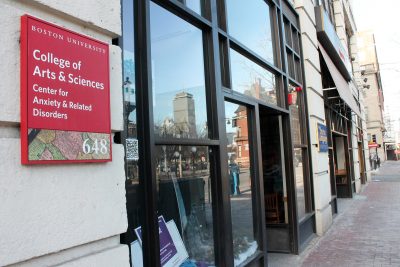
A team of researchers at the Boston University Center for Anxiety and Related Disorders is developing an online course for next semester to help incoming students process their emotions and potentially avoid developing disorders, such as depression and anxiety.
Shannon Sauer-Zavala, a researcher and professor in the Department of Psychological and Brain Sciences, is leading the team.
“We’re really excited,” Sauer-Zavala said. “We feel like it fits both a need on BU’s campus and our perception of what students maybe aren’t getting enough of in terms of a conversation about mental health.”
The project started in 2015 when Sauer-Zavala and Julianne Wilner, a graduate student in BU’s clinical psychology doctoral program, began to research preventative measures for anxiety and depression, developing a workshop to teach students healthy coping mechanisms for their emotions, rather than focusing on students who had already developed these kinds of disorders.
The workshop was an in-person, two-hour session working with students in Psychology 101 who were required to participate in research for the class.
“We screened people that sort of had elevated levels for anxiety and depression, but didn’t meet criteria for a clinical diagnosis, and had them come in and participate in this workshop,” Sauer-Zavala said.
One month after the workshop, Sauer-Zavala said the team found that students who participated “had reductions in their frequency of experiencing negative motions and their frequency of avoiding emotions, and an increased quality of life.”
That discovery sparked the team to think that “gosh, what would be a good way to reach more people?” Sauer-Zavala said. They then connected with BU’s Digital Learning Initiative to develop an online course.”
Sauer-Zavala said they aren’t sure if an online program will have the same results as in-person workshop, but that is one of the things they hope to learn from their research.
“For people that sort of have a little bit of a problem but it hasn’t fully developed into something more serious, there is good evidence that these prevention programs can be really helpful,” Sauer-Zavala said. “Yes, we don’t have evidence yet that this program works, but that’s why we’re developing this course to test it out.”
To get the project to the next phase, Sauer-Zavala sought help from a few undergraduate researchers. Danyele Homer, a senior in the College of Arts and Sciences, is one of the students working on transferring the workshop into an online format.
“It’s going to be a course on Blackboard, just like any other class,” Homer said. “So starting in the fall of this year, it’s going to be piloted for a group of freshmen students, and then hopefully, in the future it will eventually be a requirement for all incoming students. It’ll be similar to [AlcoholEdu], but very different content, essentially.”
Homer said the course is going to integrate quizzes, videos and other interactive segments to try and make it as engaging as an in-person workshop would be.
“A lot of people in the field are working hard to make treatments into online courses, just because it’s so much more effective as a means of disseminating information,” Homer said.
This fall, the team will see how effective the course is when tested on a large scale.
“[We’re going to] invite all of the incoming freshman into a research study where they would fill out some questionnaires,” Sauer-Zavala said. “Half of the people that sign up for the study would get to take part in the workshop, and half won’t, and then we’ll have them fill out questionnaires at several points throughout their first year to kind of get a sense of whether the people that got the workshop tend to fare better over the course of their year.”
Sauer-Zavala said if the trial is promising, the last big step would be getting the support of the administration in order to make the course a requirement of every incoming freshman.
“If the administration is really supportive of this, then it’s having people come in on day one and knowing it’s something that can be talked about at BU,” Sauer-Zavala said.
Several students said they thought the online course would be a good addition to the freshman experience at BU.
Jessica Lin, a senior in the College of Engineering, said the course could help people recognize emotions that they would usually push away.
“I think that for a lot of people, when they’re feeling bad or if something’s going wrong, they sometimes aren’t aware of it or they’re in denial, and they might not know the signs, and I think that would help with that,” Lin said. “I think it’d be really effective.”
Yukari Saito, a CAS junior, said the course is a good idea in theory, but she’s not sure it would actually make much difference.
“I don’t think students can change their behavior,” Saito said. “I don’t think it will work really well, but I do think they should advocate for this more.”
Claire Tran, a sophomore in the College of Communication, said that since the program is online, it could benefit students who might not be comfortable talking about their emotions in-person.
“College is a brand new experience for freshmen, not only academically, but also being alone and trying to make new friends, and they don’t have the support systems that they usually have at home like talking to their mom or talking to their friends,” Tran said. “I definitely think it’s a good idea.”




